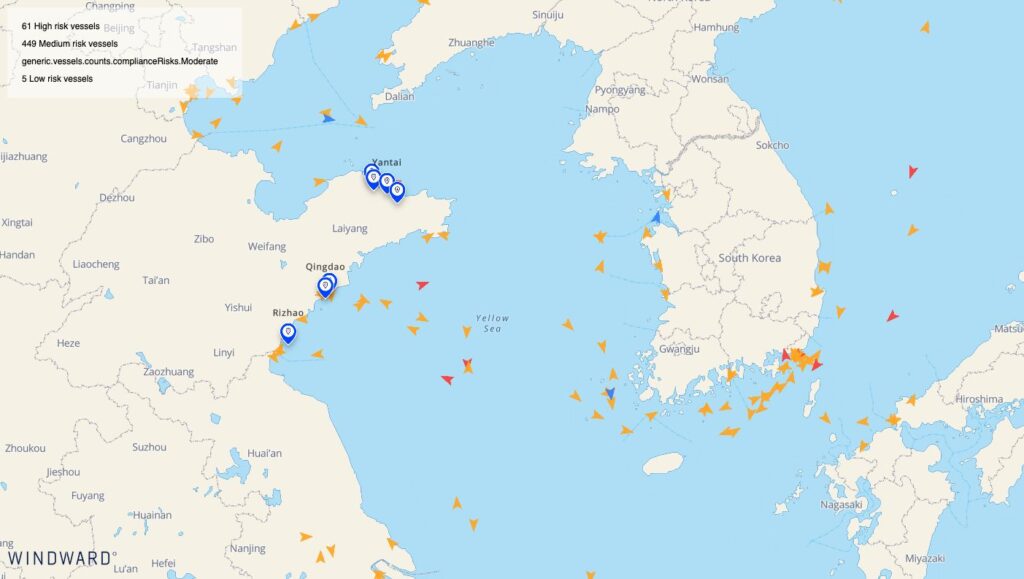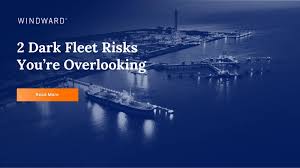The Shandong Port Group in China adds tankers sanctioned by the US to its blacklist and imposes restrictions on entry to major ports.
According to Reuters and major shipping broker Gibson, as the US expands sanctions against tankers carrying Russian crude oil, known as the “Dark Fleet,” the Shandong Port Group, a key Chinese port operator, has announced its intention to restrict the entry of tankers listed by the US Department of the Treasury’s Office of Foreign Assets Control (OFAC). As a result, some tankers used for transporting oil from Russia, Iran, and Venezuela will be barred from docking at key ports in eastern China. The tanker market is seeing spot rates for VLCCs hovering around $35,000 per day, close to break-even levels, but if the ban on port entry extends, there are concerns that the supply of mid-sized tankers, such as Aframax, may tighten.
(Text by Hirofumi Yamamoto)
Photo courtesy of WINDWARD, Euronews,

Impact of the Decision
In mid-January 2025, the Shandong Port Group notified several shipping brokers and agents about the entry restrictions for sanctioned tankers. This means these vessels will likely be denied access to key energy terminals within Shandong Province, including ports in Qingdao, Rizhao, and Yantai. These ports are crucial as they accounted for 17% of China’s crude oil imports in 2024, representing about 1.74 million barrels per day.
The decision by Shandong Port Group is expected to have a significant impact on 155 tankers listed on the sanctions list, particularly mid-to-large-sized vessels such as Aframax and Suezmax. These tankers make up 68% of the vessels affected by the sanctions, and they will no longer be able to dock at Shandong Province’s ports. Many of these vessels had been transporting crude oil primarily from Russia, Iran, and Venezuela, and a significant number of them had previously used Shandong Port Group’s terminals.
In 2024, out of the 2.4 million barrels per day of crude oil arriving at ports controlled by Shandong Port Group, 1.1 million barrels per day were imported from Russia, Iran, and Venezuela. Particularly, the flow of oil from Iran is expected to be most affected, as 67% of the vessels arriving at Shandong Ports from Iran last year were listed by OFAC. These ships will no longer be able to access these ports once the sanctions are enforced.
Impact on Independent Refiners
The Shandong Port Group’s ports are important hubs for independent refiners handling crude oil from Russia, Iran, and Venezuela. These refiners are likely to be heavily impacted, especially with the 42 VLCCs previously transporting Iranian crude now being banned from entering Shandong’s ports. This will disrupt their transportation schedules significantly.
Possible Workarounds
However, the sanctioned vessels will not be completely excluded from trade, and some potential workarounds could emerge. One such workaround is the transfer of cargo via other ports before being transported to their final destination by non-sanctioned vessels. Another possibility is the use of Ship-to-Ship (STS) transfers, allowing cargo to be offloaded from the sanctioned tankers onto vessels that are not subject to sanctions.

Market Impact
This latest round of sanctions is expected to further complicate the mainstream oil market, adding pressure on the ships involved in illicit activities, such as those in the “Dark Fleet.” The tightening of US sanctions may accelerate the movement of buyers away from sanctioned crude, leading to a reduction in demand for oil from these sanctioned countries. As a result, the flow of oil in the market may shift, and new trade routes and supply chains may emerge.
The decision by Shandong Port Group to block the entry of US-sanctioned tankers is expected to have a profound impact on the transport of crude oil from Russia, Iran, and Venezuela. This new regulation could trigger changes in distribution routes and transportation costs in the oil market, marking a significant turning point in China’s oil supply. The ongoing escalation of sanctions and the associated market shifts will require close attention moving forward.
〆ロシア原油を積んだ「ダーク・フリート」はどこに向かうのか?
中国・山東港グループが米国制裁対象のタンカーをブラックリストに追加し、主要港への入港制限へ。
ロイター通信や海運大手ブローカーのギブソンによると、米国が「ダーク・フリート(影の船団)」として知られるロシア産原油輸送のタンカーに対する制裁を拡大する中、中国の主要な港湾グループ、山東港グループ(Shandong Port Group、SPG)が米国財務省外国資産管理局(OFAC)の制裁リストに載ったタンカーの入港を制限する方針を示した。これにより、ロシア、イラン、ベネズエラからの原油輸送に使われるタンカーの一部が、中国東部の主要港での寄港を禁じられることになる。タンカー市況は、主力のVLCCのスポット用船料が1日当たり3万5000ドルと採算ライン上だが、中国の入港禁止が拡大すれば、アフラマックス型タンカーなど中型タンカーの船腹がタイトになる可能性が指摘されている。
(Text by Hirofumi Yamamoto)
Photo courtesy=WINDWARD
山東港グループは、2025年1月中旬、制裁対象となったタンカーの入港禁止を複数の海運ブローカーや代理店に通知した。これにより、これらの船舶は青島港、日照港、煙台港など、山東省内の主要なエネルギーターミナルへのアクセスが制限されることが予想されている。これらの港は、2024年に中国が輸入した原油のうち、日量約174万バレルの輸入量の17%を占める重要な拠点だ。
影響の規模
山東港グループの決定は、制裁リストに載った155隻のタンカー、特にアフラマックス型やスエズマックス型などの中型、大型船に大きな影響を与えると見られている。これらの船舶の68%がアフラマックス型以上であり、今後はこれらの船舶が山東省の港に入ることができなくなる。制裁対象となるタンカーは、主にロシア、イラン、ベネズエラからの原油を運んでおり、その多くが山東港グループの港を利用していた。
具体的には、2024年のデータによれば、山東港グループ管轄下の港へ向かう2.4mb/d(百万バレル/日)の原油のうち、1.1mb/dはロシア、イラン、ベネズエラから輸入されたものだとされている。特に、イランからの原油流通が最も影響を受けると予測されており、昨年、山東港に向かう67%の船舶がOFACリストに登録されていた。これらの船舶は、制裁発効後にこれらの港に入港することができなくなる。
山東港グループの港湾では、独立系精製業者がロシア、イラン、ベネズエラからの原油を多く取り扱っており、これらの業者にとっては大きな影響を及ぼす可能性が高い。特に、イランからの原油を運んでいた42隻のVLCC(非常に大型のタンカー)が今後は山東港に入れなくなることは、これらの業者の輸送計画に大きな影響を与えるだろう。
回避策の検討
しかし、制裁対象の船舶が完全に取引から排除されるわけではなく、回避策が取られる可能性もある。例えば、制裁を受けたタンカーが他の港を経由して貨物を転送し、最終的には制裁対象外の船舶で目的地に運ばれる方法が考えられる。また、タンカー間で貨物を転送するSTS(Ship-to-Ship)作業を利用して、制裁を受けたタンカーの関与を回避する方法も考えられる。
市場への影響
この制裁措置は、主流の石油市場にとってさらなる障壁を提供し、違法行為を行っている「ダーク・フリート」の船舶に対する圧力を高めることが予想される。また、米国の制裁強化に伴い、制裁を受けた原油を取り扱うリスクを避ける動きが加速する可能性もある。これにより、制裁対象の原油市場から手を引く買い手が増えることが予想され、最終的には市場における流通経路が変化する可能性がある。
山東港グループが米国制裁対象のタンカーの入港禁止を検討する決定は、ロシア、イラン、ベネズエラからの原油輸送に深刻な影響を与えることになるだろう。この新たな規制は、原油市場における流通経路や輸送コストに変動を引き起こし、特に中国への石油供給において重要な転換点を迎える可能性がある。今後の制裁強化とそれに伴う市場の変化に注目する必要がある。
